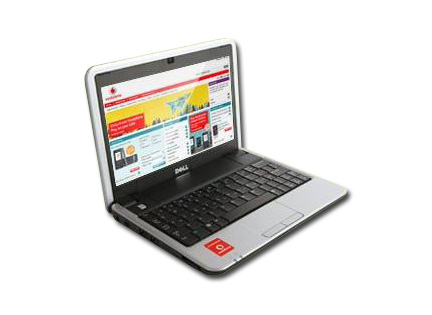Dell Inspiron Mini 9 with Vodafone mobile broadband

Our recent review of Dell's Inspiron Mini 9 netbook was largely positive (we particularly liked its three-hour-plus battery life). At the time, we noted that the Mini 9 included a mobile broadband module, but that at launch time it was inactive and no partners were announced.
Vodafone has now stepped up as Dell's UK mobile broadband partner, and from mid-October you'll be able to get the Inspiron Mini 9 'for free' on two 24-month contracts. For £25 a month you get 1GB of data, while for £30 a month you get 3GB. On both contracts, additional usage is charged at a hefty £15 per GB. These costs only apply to use within the UK. You can see all the tariff details on Vodafone's web site.

Vodafone offers the Dell Inspiron Mini 9 'free' on two-year contracts at £25/month for 1GB per month or £30/month for 3GB.
Your SIM card fits into a slot behind the removable battery, which sits at the back of the Mini 9. This is conventional for notebooks offering mobile broadband. As with its mobile broadband dongles, Vodafone is offering data download speeds up to 7.2Mbps, but coverage at this top speed is patchy to say the least. Our tests on London's South Bank and around South London did manage to reach 3G speeds (384Kbps) but often dropped to GPRS (~56kbps); we never saw 7.2Mbps.
In our previous review we looked at the 16GB model of the Inspiron Mini 9, but Vodafone's version has just 8GB of solid-state storage. This relatively small storage capacity considerably hampers what you can achieve. We installed Firefox and OpenOffice on top of Windows XP and were left with just 2.3GB for additional applications and data.
Many users will therefore need to resort to USB sticks or flash memory cards to boost storage on Vodafone's Mini 9. The notebook's flash memory slot supports both SD and Memory Stick formats. We tried SanDisk's newly announced 16GB SDHC MicroSD card via an SD card adapter, which was recognised without trouble. Alternatively there are three USB ports; you can run some applications from USB sticks, which could be a saving grace.
The keyboard, although small, is well constructed. We weren't disturbed by the incorporation of the Fn key row into the A-L row, although frequent Fn key users may find this more challenging. We did have to cut our touch-typing speed by about a third to retain accuracy on the cramped keyboard, although this may improve as we get used to it.
The 8.9in. 1,024-by-600-pixel display is a reasonable size for both web browsing and document editing. This is probably the smallest size at which a screen is truly usable for serious computing, although it's not feasible to have two document windows opened side-by side.
As far as performance is concerned, things are fine when typing data into applications, but we had to wait when launching programs. Also, getting online via Vodafone's mobile broadband took longer than we usually experience with its USB dongle in a standard notebook.
We agree with the full review that the Inspiron Mini 9 is fine for basic tasks, but you do need to keep your expectations modest. The addition of a solid integrated mobile broadband connection is a definite benefit, but we do question Vodafone's decision to cap data usage at such a low level, and then to charge an exorbitant fee for overrunning. With this kind of data cap, the Inspiron Mini 9 is a lot less attractive as a second business notebook than it might otherwise be.